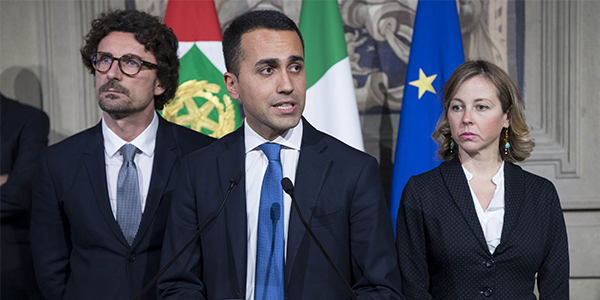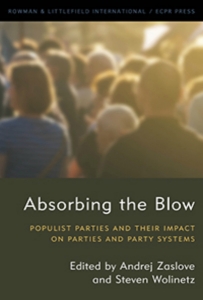Book Review | Absorbing the Blow: Populist Parties and their Impact on Parties and Party Systems edited by Steven Wolinetz and Andrej Zaslove
In Absorbing the Blow: Populist Parties and their Impact on Parties and Party Systems, editors Steven Wolinetz and Andrej Zaslove bring together contributors to help understand the impact of populism upon different party systems across Europe. This is not only an important contribution to scholarship on populism, writes Toygar Sinan Baykan, but also a highly illustrative, up-to-date introduction to the contemporary politics of many European countries.

Senator Danilo Toninelli, Deputy Prime Minister of Italy Luigi Di Maio and Italian Minister for Health Giulia Grillo, M5S, 2018. Picture: Presidenza della Repubblica/Wikipedia Public Domain
Absorbing the Blow: Populist Parties and their Impact on Parties and Party Systems. Steven Wolinetz and Andrej Zaslove (eds). ECPR Press. 2018.
 Political theorist Benjamin Arditi once defined populism as the drunken guest at a dinner. Following the surge of populism across Europe, political scientists have taken a long time to understand exactly who this disruptive guest is. Consequently, since the late 1990s, the literature on populism has been dominated by the question of what defines populism, rather than why it emerges and what kind of impact it has on democracies and political systems. But, in recent years, we have witnessed many social scientists searching for answers to these vital questions. In this respect, Absorbing the Blow, the new volume edited by Steven Wolinetz and Andrej Zaslove, can be considered an important contribution to this wave, and one which helps us to understand the impact of this drunken dinner guest.
Political theorist Benjamin Arditi once defined populism as the drunken guest at a dinner. Following the surge of populism across Europe, political scientists have taken a long time to understand exactly who this disruptive guest is. Consequently, since the late 1990s, the literature on populism has been dominated by the question of what defines populism, rather than why it emerges and what kind of impact it has on democracies and political systems. But, in recent years, we have witnessed many social scientists searching for answers to these vital questions. In this respect, Absorbing the Blow, the new volume edited by Steven Wolinetz and Andrej Zaslove, can be considered an important contribution to this wave, and one which helps us to understand the impact of this drunken dinner guest.
In Absorbing the Blow, contributors seek to understand the impact of populism in the more established and/or consociational democracies of Northern and Western Europe and in the bipolar, adversarial and/or less institutionalised party systems of Southern and Eastern Europe. Wolinetz and Zaslove underline that:
party systems are more than collections of parties. Instead, characterised by regular recurring interactions, they embody the fraternal relations among parties that regularly work together and the less-friendly relations among others that do not cooperate as readily or often (4).
Embracing the ideational approach of Cas Mudde, Wolinetz and Zaslove define populist parties as those that rely on ‘thin-centred ideologies that combine a Manichean view of elites who are deaf to what the people really want with diverse points of view’ (12). Mudde’s approach to populism is shared by other contributors to the volume.
In nine chapters, covering the cases of Austria, the Netherlands, Switzerland, Scandinavia, Finland, France, Italy, Poland and Hungary, the volume demonstrates the varying impact of populist parties on other parties and on party systems as a whole. For instance, while the impact of populism on rather more well-established party systems has been contained due to resilient consociational arrangements, as the Swiss case illustrates (96), in countries like Italy, the rise of populism has entailed much more dramatic changes.
In a highly illustrative chapter, Bertjan Verbeek, Andrej Zaslove and Matthijs Rooduijn not only analyse the impact of populism in Italy, but also demonstrate the transformation of the Italian party system since the Second World War. A major issue, which cuts across all of the volume’s chapters, appears in this contribution too: is populism the reason for or the consequence of party system change? In the Italian case, it seems that populist forces such as the political parties Lega Nord (Northern League) and Silvio Berlusconi’s Forza Italia can be considered responses to a party system crisis, or to the demise of the legitimacy of the partitocrazia in Italy, which lasted from the end of the Second World War to the end of the 1980s. Yet, there is no doubt that populist forces have deeply shaped the party system of the Second Italian Republic through imposing their agendas on mainstream parties, occupying office and also by becoming mainstream parties themselves and creating their own populist competitors such as M5S (the Five Star Movement).
In Poland, too, populism has had a huge impact on parties and on the party system by paving the way for polarisation and the further fragmentation of an already fragmented party system and by driving mainstream parties such as the Law and Justice Party (PiS) in a more populist direction (243-44).
In an excellent analysis of recent Hungarian politics, Zsolt Enyedi and Daniel Rona demonstrate not simply the influence of populism, but also its centrality in the formation of the party system as a whole. As the authors indicate, for example, when it comes to the role of Fidesz, it is pointless to examine this party’s influence on the system because it is so large and central to it: ‘Fidesz […] is the Hungarian party system’ (251). And another, not really small competitor, Jobbik, has kept influencing Fidesz’s agenda since it became a significant player in the party system in 2009.
These analyses of the Hungarian and Italian party systems in fact demonstrate the caveats evident in some of the volume’s presuppositions. As Enyedi and Rona highlight, it could be misleading to think that ‘parties can be categorized as populist and non-populist’ and that ‘populist parties are not identical with the core parties’ (251). This is a problem that is strongly connected to the definition of populism embraced by the volume. The ideational approach to populism does not usually lead to a gradual evaluation that can allow researchers to locate parties along a scale of populism. In fact, many parties today adopt populism to a lesser or greater extent, and it is important to have a more nuanced view of populism that can help researchers analyse the degree of populism embraced by the parties in a given party system.
The other implication of the ideational approach to populism, which originally stemmed from analysis of the far right in Europe, is that it leads researchers to focus on right-wing politics more than those of the left. It would have been much better to have a sub-title for the book which emphasises the volume’s emphasis on ‘right-wing politics in Europe’, since it contains little discussion of left-wing populism or populism in other regions across the globe.
The appeal of this volume would also have been greatly enhanced had a discussion of cleavage structures accompanied all chapters. It is only the volume’s last chapter, by Wolinetz, which addresses the connections between a) the increasing significance of a socio-cultural divide; b) populism; and c) the change in the party systems: ‘Populist parties are one of several factors that shape and reshape party systems but not necessarily the most important’ (308). The rise of the ‘socio-cultural’ divide in the West, separating social segments holding cosmopolitan, green and libertarian values from popular sectors with local, traditional and nativist sensibilities, could have been highlighted more thoroughly in the volume. Indeed, it would seem that it is the increasing salience of the ‘socio-cultural’ divide that has facilitated the rise of populist parties and the party system change, rather than vice versa.
Nevertheless, Wolinetz and Zaslove’s volume not only represents an important contribution to our understanding of the impact of populism on European party systems, but it is also a highly illustrative, up-to-date introduction to the contemporary politics of many European countries for scholars of comparative politics and populism, as well as for a broader audience, including students, policymakers and journalists.
Note: This review gives the views of the author, and not the position of Democratic Audit. It was first published by the LSE Review of Books blog.
Toygar Sinan Baykan is Assistant Professor of Political Science and Public Administration at Kirklareli University, Turkey. He attended the Middle East Technical University and Universiteit Leiden for his postgraduate studies and has a master’s degree in comparative politics from the London School of Economics and Political Science. He received his PhD degree in politics from the University of Sussex, with his dissertation focusing on the populism and organisation of the Justice and Development Party in Turkey. His reviews have appeared in Party Politics and Political Studies Review. He is the author of The Justice and Development Party in Turkey: Populism, Personalism, Organization (Cambridge University Press, 2018). His research interests include party politics, comparative politics and populism.





 Democratic Audit's core funding is provided by the Joseph Rowntree Charitable Trust. Additional funding is provided by the London School of Economics.
Democratic Audit's core funding is provided by the Joseph Rowntree Charitable Trust. Additional funding is provided by the London School of Economics.